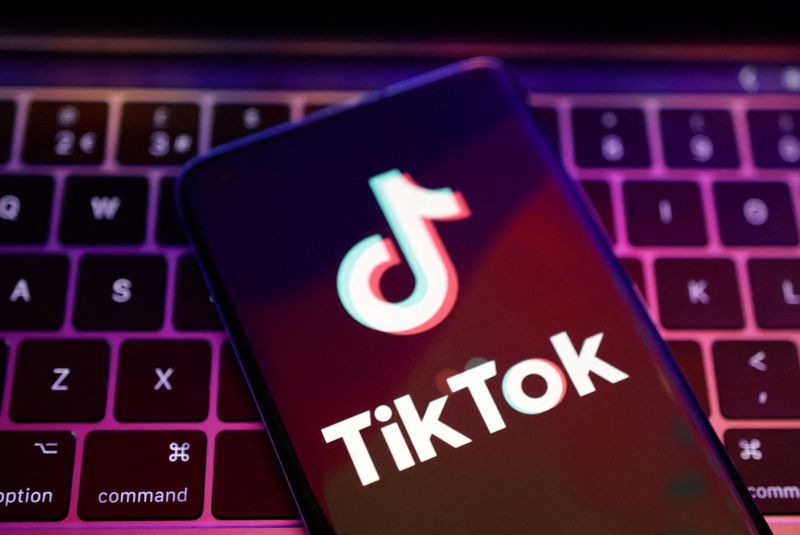By David Shepardson and Michael Martina
WASHINGTON (Reuters) -A bipartisan group of U.S. lawmakers introduced legislation on Tuesday to give China's ByteDance about six months to divest popular short video app TikTok or face a U.S. ban, seeking to tackle national security concerns about its Chinese ownership.
The bill is the first significant legislative move in nearly a year toward banning or forcing ByteDance to divest the popular app, after senate legislation to ban it stalled in Congress last year in the face of heavy lobbying by TikTok.
Mike Gallagher, the Republican chair of the House of Representatives' select China committee and Representative Raja Krishnamoorthi, the top Democrat, are among more than a dozen lawmakers introducing the measure, which is expected to see an initial vote on Thursday.
"This is my message to TikTok: break up with the Chinese Communist Party or lose access to your American users," Gallagher said. "America’s foremost adversary has no business controlling a dominant media platform in the United States."
The bill would give ByteDance 165 days to divest TikTok, which is used by more than 170 million Americans, or make it unlawful for app stores run by Apple (NASDAQ:AAPL), Google (NASDAQ:GOOGL) and others to offer TikTok or provide web hosting services to apps controlled by ByteDance.
The bill would not authorize any enforcement against individual users of an affected app, however.
"This bill is an outright ban of TikTok, no matter how much the authors try to disguise it," a company spokesperson said on Tuesday.
"This legislation will trample the First Amendment rights of 170 million Americans and deprive 5 million small businesses of a platform they rely on to grow and create jobs."
A White House National Security Council spokesperson called the bill "an important and welcome step" adding that the Biden administration would work with Congress "to further strengthen this legislation and put it on the strongest possible legal footing."
The administration has worked with lawmakers from both parties to counter threats of tech services operating in the United States that pose risks to Americans’ sensitive data and broader national security, the official added.
TikTok says it has not, and would not, share U.S. user data with the Chinese government.
The American Civil Liberties Union called the bill unconstitutional, saying lawmakers were "once again attempting to trade our First Amendment rights for cheap political points during an election year."
The bill, which would required companion legislation in the Senate, will be considered at an Energy and Commerce Committee hearing on Thursday for a vote.
Rep. Cathy McMorris Rodgers, who chairs that committee, said the bill would "prevent foreign adversaries, such as China, from surveilling and manipulating the American people" via online applications such as TikTok.
Still, the popularity of the app could make it tough to get legislation approved in an election year. Last month, Democratic President Joe Biden's re-election campaign joined TikTok.
The bill would give the president new powers to designate apps of concern posing national security risks and subject them to the risk of bans or curbs unless ownership was divested.
It would cover apps with more than a million annual active users and under control of a foreign adversary entity, the bill says.
Concerns about Chinese-owned TikTok sparked efforts in Congress last year to tackle the risks from the short video sharing app or potentially ban it. Late in 2022, Congress barred federal employees from using it on government devices.
Last year the administration backed legislation sponsored by Senator Mark Warner and more than two dozen senators to give it new powers to ban TikTok and other foreign-based technologies if they pose national security threats.
That bill has never been voted on.
The U.S. Treasury-led Committee on Foreign Investment in the United States (CFIUS) in March 2023 demanded that TikTok's Chinese owners sell their shares, or face the possibility of the app being banned, Reuters and other news providers reported, but the administration has taken no action.

The new bill aims at bolstering the legal authority to address TikTok concerns. U.S. courts blocked an effort by previous President Donald Trump to ban TikTok in 2020.
Late in November, a U.S. judge blocked Montana's first-of-its kind state ban on TikTok, saying it violated users' free speech rights.
